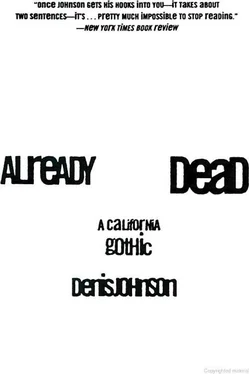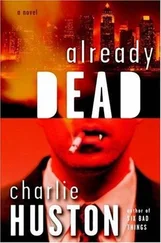The headlamps lit the ruts undependably, but he knew his way around the big ones, and before the moon had made ten degrees of arc he’d topped the drive and the ridge and was making east on Shipwreck Road, passing through pockets of varied airs that signalled, but not clearly, something noteworthy in the weather. By the time he’d reached the garden and hidden the Scout amid coils
196 / Denis Johnson
of manzanita, the wind was treading over the evergreens on the canyon’s north, and he could smell the wet on it. He carried a flashlight but didn’t use it descending, just checked any plunge with the jacks of his boots and went down in the dark hugging his sleeping bag with the plastic tarp and the Coleman stove wrapped within it. By the garden he made his camp quickly — braced the tarp with twine and made an A-frame and lay inside it. During a half-minute’s eerie calm he breathed the pungency of the plants and also, with the higher air cooling quicker than the lower, a whiff of creosote just now rising from the valley. He could very nearly taste it in his throat.
As the storm broke it drove in under his protection. More wrack than rain, it didn’t douse him badly. He sat with his knees drawn up and his head jammed between, heaving on personal seas, stunned and clinging, his life’s tremendous wheel turning over. He looked up at it and howled out loud, Who runs this scam? The words went under in the medium gale — thankfully, as they conveyed nothing of how privileged he felt to find his inner maelstroms matched by outer ones, as if all the powers endorsed and had even orchestrated his journey. For years now the weather hadn’t been typical. The drought through months that should have rained, and then the recent almost unprecedented August downpour, and now this one shooting tiny stinging drops that blew for three-quarters of an hour. Then it ceased, whisked itself away, be-queathing the calm of the morgue and a thin general mist. The silence rolled through him too, and he lay back to drift pleasantly down through his exhaustion. He’d brought nothing for breakfast, but he’d see to that briefly tomorrow, drop into the Anchor Bay Store and lay in some necessities and be back in an hour. He’d wake tomorrow and go down the hill and buy beans and eggs, bread and cheese, coffee and canned meat — and didn’t know it yet but he’d also learn of Nelson senior’s death and how everything was changed and how the sons, the brothers, owned ten thousand acres of California; and he wouldn’t return here for many days.
and then , read the blood-marbled pages John Navarro held in his hands one year later—
and then in its every detail I envision it, how with the rain’s letup Van Ness you came yourself into a spell of calm and leaned against Already Dead / 197
the Volvo on the passenger side, draped your arms over the roof, laid down your head across your dripping khaki sleeves. Curious how the weather gusted out there in the seaward black, while right around you along the coast road everything wilted and scarcely sighed. You were drenched. You thought of yourself as glistening. Every few minutes as a vehicle passed from behind and rolled you through a bath of light it came to you afresh that these people didn’t know in the least what they were looking at.
And me, the sucker, Nelson Fairchild, Jr. — he hadn’t known. But now his eyes would be opened.
You got back inside the car, crossed the Gualala River onto the Sonoma County side and laid by again in sight of a bleached derelict cattle barn, its shape both looming and tentative at this lightless hour.
You had another stop to make tonight, but not yet, a little time to kill before — and now you started laughing out loud, and the ocean laughed back. You wiped your mustache energetically, laid the white kerchief on the dash and turned to and cracked open with your dirty hands the Fairchild family’s copy of Thus Spake Zarathustra , stolen earlier that night from Winona’s living room.
And didn’t you find this place in earshot of the sea’s cachinnation and tolling completely in accord with your new understanding of Friedrich Wilhelm Nietzsche’s words, of how Nietzsche’s words rang hollow — kid scaring his elders to fend aside his own true terror, he’d never actually lived it all the way out, never tasted his own wares — and weren’t you thinking about his words as you reversed direction three hours later and drove to the hill on the coast road’s east side looking down at the hooded unintelligent eyes of the house where Nelson Fairchild, Sr., lay dead, as you watched the comings and goings of people with grim business in that place, and as you followed — at a great distance, but easily because it was the only other vehicle out that late — my, Nelson Junior’s, sports car up onto the ridge road and into the iron moonless dark and nearly overtook him there; weren’t you still thinking about Nietzsche as you pulled to the roadside a hundred feet back of the stranded Porsche and waited and listened while far, far away the Pacific rolled a marble down a tin groove of infinite turnings; thinking in particular of certain of Nietzsche’s lines concerning evil, a subsistence with which it pained — or did it exult? — you to admit the philosopher had never really stained his fingers—
198 / Denis Johnson
An image made this pale man pale. He was equal to his deed when he did it: but he could not endure its image after it was done.
— and thinking in special particular of one line you’d perhaps read over and over and felt you were probably enacting at this moment as you moved toward Nelson completely sightless but smelling him out by his fear—
In wickedness, the arrogant and the weak man meet. But they misunderstand one another.
— reviewing this line in great confidence having proven it wrong by experiment, by deeds, in fact knowing it wrong because we, you and I, the arrogant man and the weak, understood one another exactly to the degree necessary?
You heard the tenor of your footsteps alter, warped by the car’s acoustic mass, you bumped your hand against the car’s left rear quarter panel and dragged your fingers along the canvas top until they plumbed midair at the driver’s open window, heard the driver’s terrified breathing but couldn’t find him in the drisky black except by reaching through the window until you touched his face. You could have put your fingers to your lips and tasted his tears. And you heard with a curious grieving apprehension the action of your own innards and thought to yourself that Nietzsche never experienced his own guts in his belly, not truly, not like this, and the other said — I wasn’t even sure you owned a car.
— You recognize me.
— Of course I do.
— You think you do.
— My father is dead.
Only the purity of this darkness kept you from laughing out loud.
— And my wife is still alive. As you know perfectly.
You kept quiet because the noise of words seemed to create this place by inhabiting it — nearness, farness, a space…The other coughed in the dark and you believed you heard him spit through the opposite window.
He spoke again:
— This is the most absurd night in my experience. It’s completely liberating.
Already Dead / 199
— Don’t bore me with lies. You don’t get liberated by someone else’s life or death.
— I mean the absurdity. The absurdity’s liberating. Okay?
— Okay by me Jack.
— What happened?
— What happened when my friend?
— Don’t piss me off, Van Ness! How do you know I’m not pointing a gun at you right now?
— Maybe a three-five-seven? Maybe for instance a Smith & Wesson?
Maybe because I’m pointing it at you.
— What is that thing?
Читать дальше












